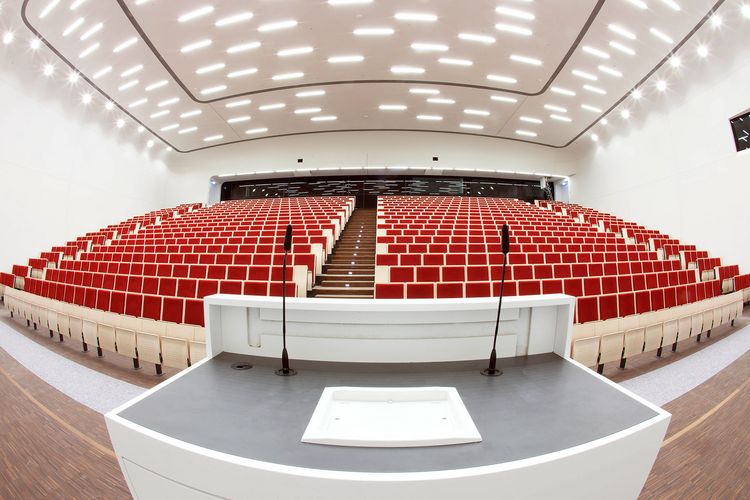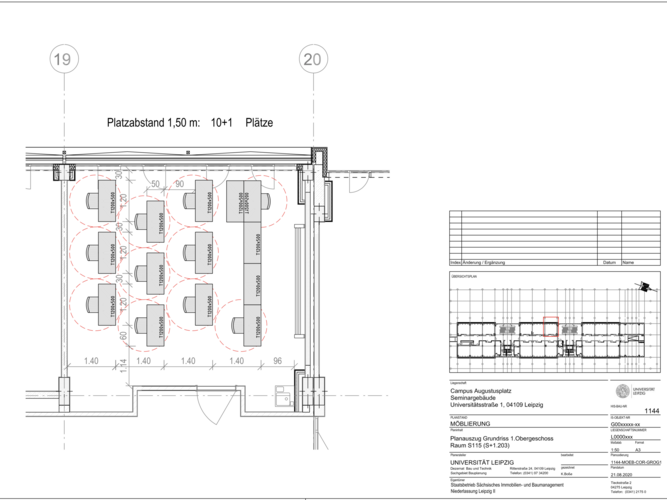The winter semester 2020/21 will start with a two-week orientation phase (12 until 23 October). Teaching will begin on 26 October. A ceremony to welcome newly enrolled students is due to take place on 4 November.
“For our new students, of course, it is particularly important that they have an opportunity to find their feet at our university,” emphasised the Rector, who is pleased that, at around 40,000, the number of applications for a study place has already equalled last year’s level. “This time there will not be a central introductory week where everyone can get the information they need and meet each other on the main campus. But our plan B is very impressive indeed: we have devised a range of on-site alternatives, from information sessions for small groups, to mentoring programmes where new students can meet more their more seasoned peers. And the faculties and institutions, such as the University Library and the University Computing Centre, are also putting on digital services, including explainer videos and checklists.”
Full details of what’s on offer will be available on the website at www.uni-leipzig.de/en/startin2020 from October. There you will also find information about guidance and services for students as well as networking opportunities. The ceremony to welcome newly enrolled students will be broadcast live from the Paulinum – Assembly Hall and University Church of St. Paul on 4 November. A draw will be held for the limited number of places available in the Paulinum and the Audimax lecture hall. All other new students will be able to watch the event from home together with friends and family. As always, all newcomers can pick up one of our famous welcome bags from various distribution points during the first weeks of the semester.
Professor Thomas Hofsäss, Vice-Rector for Education and International Affairs, pointed out that the University’s planning is based not least on our experience during the summer semester. “Our student survey has shown that we were successful in our switch to online formats, both technically and in terms of content. Our lecturers received widespread praise for their hard work. But it has also become very clear how important it is to be around other people – how much our motivation, and our social lives, suffer when we don’t see each other in person.” He added that the students’ overall assessment of the online semester was that while doing things online is good, doing things online is even better when embedded in a physical University context.
“Due to the limited space available as a result of social distancing requirements, there will of course be no large lectures on campus in the winter semester,” explained Thomas Hofsäss. “To give you an example: our largest lecture hall, the Auditorium maximum, can currently accommodate 122 people with the necessary social distance – instead of the usual 817.” With this in mind, preparations are well under way to offer hybrid formats, allowing courses to be taught with some students present in rooms on campus while others participate online. “Some classes will also start online and include a block seminar on campus. But in some cases, of course, we will continue to have purely online teaching. It will be a mix, and we will adjust that mix based on how things go and, of course, on infection levels.”
Talking of rooms on campus: Leipzig University’s buildings will be open to the public again from 1 October. The Department of Construction and Technical Services is currently working on equipping as many seminar rooms as possible with the necessary equipment for hybrid teaching. “The plan is to install the equipment for hybrid teaching – meaning cameras, speakers and microphones – in 38 seminar rooms on the Augustusplatz campus. Another 20 rooms on the Jahnallee campus and various rooms in other faculties could also be included,” explained Vice-Rector Hofsäss.
The first trial runs have taken place, with more to follow throughout September. It is not yet possible to say exactly when the new equipment will be installed in which room. Information on the technical equipment planned for the rooms on the Augustusplatz campus is available in German in a PDF document that will be updated regularly.
“As for room allocation, staff at the Department of Construction and Technical Services have done an outstanding job of calculating how many places are available in each room under the current hygiene regulations,” noted Thomas Hofsäss. The furniture in those rooms has already been arranged accordingly.
The Hygiene and Infectious Disease Concept, which Leipzig University introduced in May 2020, is currently being updated in line with new general findings and to reflect changes to the requirements imposed by the Free State of Saxony and the Federal Ministry of Labour and Social Affairs. It defines the basic conditions under which the University can implement its planned hybrid teaching approach, with students attending in person some of the time. Information will also be provided on social distancing requirements and the need to wear face masks as well as on using and regularly airing rooms.
“As always, the faculties and lecturers are, of course, responsible for deciding how to organise each course,” said Rector Beate Schücking. If necessary, they could decide according to the size of the group and also the degree of interaction required within the class in question. “In cases where periods of face-to-face teaching have to be staggered between lower and higher semesters, first-semester students and third-semester bachelor’s students will have higher priority until Christmas.”
Another sensible solution is planned at the Faculty of Chemistry and Mineralogy, where first-semester students will take it in turns to attend lectures at the faculty, giving students the opportunity to get to know each other. “We should make no mistake: the challenges are still great, and none of us can foresee how the infection rates will change. But our focus from the very beginning was on combining prevention and continuity. And that is how we mean to go on.”































































